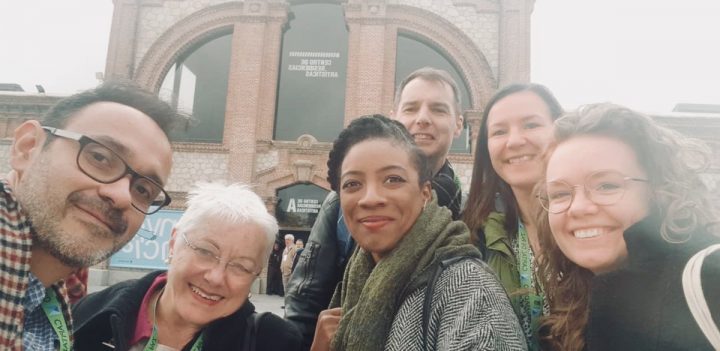At the II World Forum on Urban Violence and Education for Coexistence and Peace, in Madrid from the 5th to the 8th of November, Pressenza took the opportunity to cover activities carried out by the international team of activists from ICAN.
A combined presentation by Dr. Aurora Bilbao from IPPNW and Hayley Ramsay-Jones from Soka Gakkai International covered two very important topics: the humanitarian consequences of nuclear weapons and the intersectional aspects of gender and race discrimination in nuclear disarmament.
We were especially interested to find out more about the gender and race aspects to nuclear disarmament, so after the presentation we caught up with Hayley to ask her a few questions…
Video by Álvaro Orus.
Pressenza: Please present yourself and the organisation you work with.
Hayley Ramsay-Jones: So my name is Hayley Ramsey-Jones and I work for Soka Gakkai International. We are a partner organization of the International Campaign to Abolish Nuclear Weapons and I work with them as a campaigner.
PZ: In your presentation you gave the impression that by definition a nuclear weapon is racist. Please can you explain more?
HRJ: So nuclear weapons are problematic because by nature they are genocidal. If we think about the idea of the willingness of a group of people, or a nation, to destroy in whole, or in part, another group of people, or another nation; to obliterate their culture, their way of life; to destroy their religious, ethnic, racial identities. This is the very definition of genocide and that’s xenophobic and racist.
PZ: You also talked about the disproportionate effect of nuclear weapons on indigenous people…
HRJ: Countries like the UK, the US and France have unapologetically dropped their bombs, their nuclear waste and tested on non-white populations in Africa and Asia-Pacific, also on poor people’s and indigenous people’s lands in the US and Australia. These countries that call themselves nuclear responsible states have done so without acknowledging or giving any reparation for people living in Kiribati, in Fiji, in French Polynesia and the Marshall Islands, where we still see inexplicably high levels of cancers and also birth defects and uninhabitable spaces.
PZ: Please elaborate more on the medical impacts of nuclear weapons on women and children.
HRJ: So initial research that was done on the impacts on humans of nuclear weapons was only ever done on the standard height male body which is problematic in itself. Later research was done on women and children’s bodies. There’s some research done by Mary Olsen on this which shows that women and children suffer more severe effects. If you look at women’s reproductive tissues for example and other issues, they have more severe effects and more severe harm on their bodies, and also children of course who are still developing suffer more severely than the standard height male body.
PZ: Finally, what efforts are being made to counteract this endemic discrimination?
HRJ: So, I mean I’m not sure that enough is being made. I think that certainly not enough is being made in terms of governments and some of our institutions that should be looking at this, but I think even we as civil society, I think those of us who are working in peace and disarmament, have a responsibility to also promote peace and disarmament in our work, and I think this is often very difficult to do, but we tend to replicate some of the same discriminatory structures and practices and behaviours as those institutions and governments that we try to change, and you know I think that’s a learning process for all of us, but I think that we can look at intersectionality and try to have a more intersectional approach to our work which will help us identify whose voices are not being heard and where there might be inequalities and misuse of power within our own organizations, and I think this will then help us better address the social injustices in the world, at large, and nuclear weapons being the biggest social injustice of them all.






